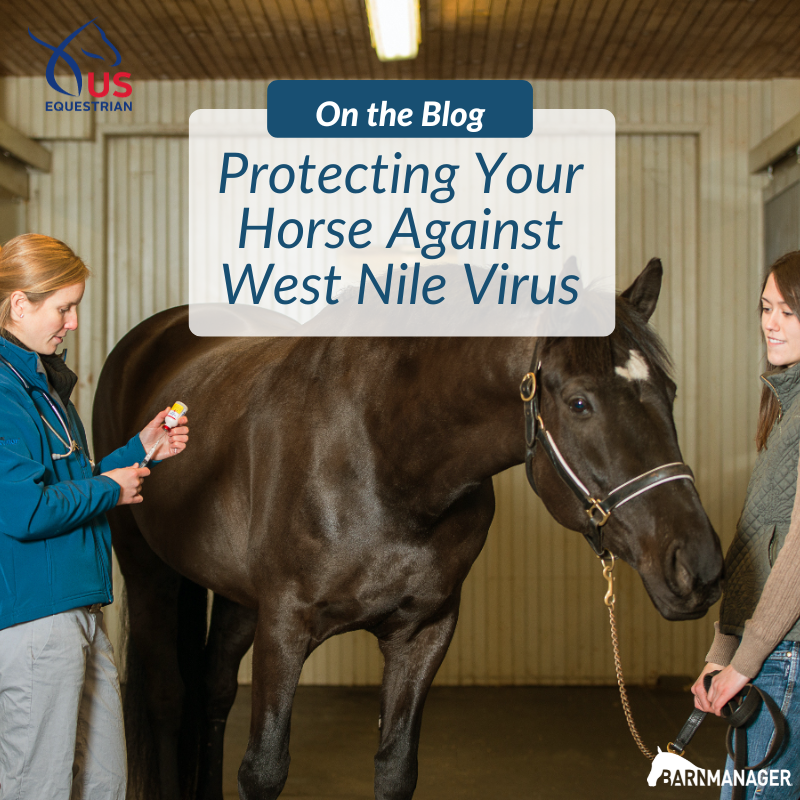
Protecting Your Horse Against West Nile Virus
By Glenye Cain Oakford
BarnManager is the Official Barn Management Software of US Equestrian.
It’s been a rollercoaster year for weather in the United States, with record-breaking heatwaves, dirt-cracking drought, and flooding rainfalls. That pattern hasn’t only been a trial for average citizens and livestock owners — it’s also setting the stage for a potentially larger and longer season for West Nile virus, experts say. There are things you can do to reduce the risk to your horses, including eliminating standing, stagnant water sources where mosquitoes carrying West Nile virus breed. But the best way to protect your horses from West Nile virus is even simpler: vaccinate them against it.
US Equestrian talked to Kevin Hankins, DVM, MBA, Managing Equine Veterinarian for Zoetis Animal Health, for insights about this year’s West Nile virus outlook, how the vaccine works, and the effects of the virus on unvaccinated horses.
Why is this year going to be a potentially bad year for West Nile virus in horses?
When we look back historically over West Nile virus outbreaks, whether it’s in the United States or in Europe, a common pattern we see is an extended drought period that’s followed by rain. An ambient temperature of 86 degrees Fahrenheit is ideal for replication of the mosquito and replication of the virus in the mosquitoes. What happens during drought conditions — which is counter-intuitive to what people think about mosquitoes and lots of rain — is that those bodies of water become stagnant and smaller, which makes them easier to heat up. That makes them ideal breeding conditions for mosquitoes. And it makes them have ideal conditions for that virus to replicate within those mosquitoes.

Photo Courtesy of Karin Belgrave/Zoetis Equine
When you get these small bodies of water, lots of virus replication, and lots of mosquito replication and then a big rain comes, it takes all the small, infected mosquito pools and spreads them out all over the place. So now you have infected mosquitoes that are more widespread and able to start their own breeding pools in other places while the temperature is still high. These factors come together to create ideal circumstances for the spread of the virus and for infections.
This year, weather conditions in many places are setting up perfectly for not only an early season, but maybe even an extended season of West Nile, as well as a higher number of mosquitoes carrying the virus.
When is the typical timeframe for West Nile virus season?
Traditionally, in most of the country, the highest number of cases start occurring in August, especially in the Midwest, where the season will go through October. In other parts of the country, like Florida and the rest of the Southeast, the West Nile virus season can extend all year.
What we’ve seen so far this year is an earlier occurrence; we saw some West Nile virus cases in some parts of the U.S. starting in June. In the Midwest, we started seeing cases in July instead of August this year. We worry about the length of the season because the longer it stays warm the longer the West Nile virus season can extend. But I worry more about the number of infected mosquitoes because that increases the odds of a horse or human being bitten by one that is infected. There was a study, I believe at Texas A&M, showing that a horse near an infected mosquito pool can be bitten up to 5,000 times an hour. The chances of an unvaccinated horse in this kind of situation contracting West Nile virus are astronomical; it would be crazy to think they weren’t going to get it.
Have questions about utilizing BarnManager or want to give it a try for yourself? Request a live demo here!